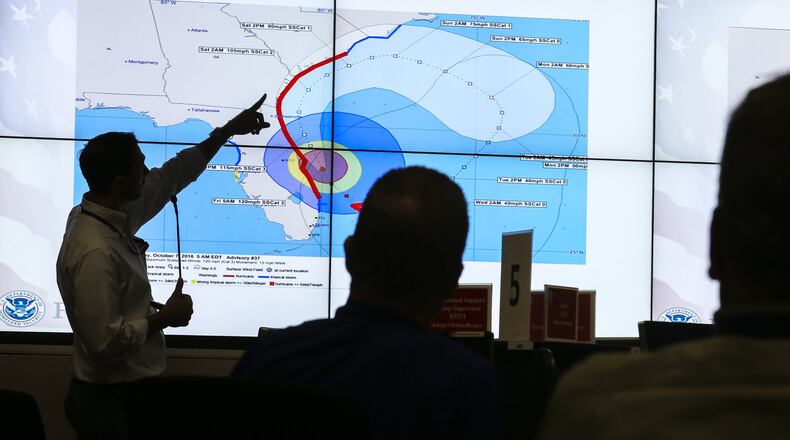Thousands had evacuated their homes, 130,000 had no electricity, and 2,000 members of the National Guard were headed to coastal Georgia on Friday. And Hurricane Matthew had not yet roared its way across the state line from Florida.
But the massive, deadly storm was on the way, and heavy rains and strong winds arrived first. While federal, state and local government leaders warned residents to prepare, plans were already in place to deal with Matthew’s aftermath.
In a news conference Friday afternoon at the state Capitol, Gov. Nathan Deal and the heads of key state agencies updated the situation along the coast and advised anyone who has not yet evacuated that it’s too late.
"For those still in the path of the storm, stay indoors during the hurricane and away from windows and glass doors," Jim Butterworth, director of the Georgia Emergency Management Agency, said. "Emergency response may not be available for up to 72 hours after Matthew has passed. First responders will not be allowed to respond in conditions that endanger their personal safety."
Butterworth said 9,000 Georgians are in shelters across the state, but there are 13,000 spaces available. The Red Cross has 23 shelters in place, a spokeswoman for the agency said. More than 900 hospital patients and 116 long-term-care patients have also been evacuated.
Deal spoke with President Barack Obama on Thursday and asked that he sign an order declaring a federal emergency. Obama did so, and on Friday the president urged residents along the coast to remain vigilant.
"Those of you who live in Georgia I think should be paying attention because there's been a lot of emphasis on Florida, but this thing is going to keep on moving north, through Florida, into South Carolina," Obama said at the White House. "There are large population centers there that could be vulnerable, so pay attention to what your local officials are telling you."
FEMA and the Georgia National Guard
The Federal Emergency Management Agency (FEMA) has a Regional Response Coordination Center activated in Atlanta, as well as the National Response Coordination Center at FEMA Headquarters in Washington, D.C. FEMA deployed 10 Urban Search & Rescue task force teams to Florida and Georgia to support search and rescue missions. The Georgia National Guard has also activated 1,000 troops to assist in the response, and late Friday, an additional 1,000 troops were deployed.
On Friday, state transportation leaders ended the reversal of the westbound lanes of I-16 from Savannah to Macon, but the eastbound lanes in that area will remain closed. Georgia Department of Transportation Commissioner Russell McMurry said bridge inspectors will be deployed Saturday to inspect bridges and culverts.
“That cannot happen until the water and the flooding recedes,” McMurry said. “So again, first order of priority is to get the damage assessment done. With the flooding that was predicted there’s a real possibility that we can have roadway failures.”
Georgia Power and Cobb Fire Department
Though metro Atlanta is hours away from Matthew’s path, some workers were heading to storm-hit areas Friday to offer help.
Georgia Power plans to respond to power outages with nearly 5,000 personnel from the company and assisting utilities. Crews are strategically positioned inland, including Macon, Statesboro, Adel and elsewhere, and are ready to re-enter coastal Georgia as Hurricane Matthew subsides.
The Cobb County Fire Department deployed six swift water rescue technicians along with a water rescue jet boat to a staging area in Perry. On Saturday the department will send three helicopter rescue technicians to help.
Additionally, six employees with Marietta Power and Water headed south Friday afternoon with a foreman’s truck, two bucket trucks, a line truck and a backyard machine, a city spokeswoman said.
State leaders cautioned that once the storm has passed, those who have evacuated shouldn’t immediately rush home.
Col. Mark McDonough, chief executive of the Department of Public Safety, said once the storm clears, his officers will help utility companies and debris removal teams enter the area.
“Wait a while. Be patient,” McDonough said. “Give us the time to restore things before you think about going back in.”
About the Author
The Latest
Featured


